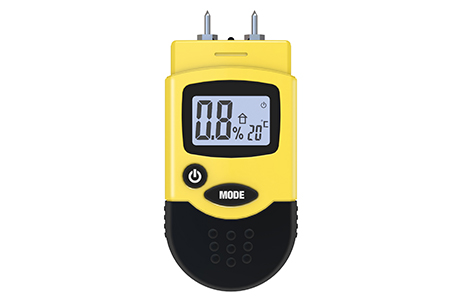Quick wood and building moisture measuring unit: BM12 by Ambale CO.
Fast and reliable measurement of wood and building material moisture
If you are looking for a fool-proof and easy to use wood and building moisture measuring unit then BM12 is the best solution. With the help of this device, the user can get reliable measurements within seconds. The insertion pins are highly effective in establishing a solid connection between the device and the test surface. What more these insertion pins come with easily changeable features. The device holds to selectable measuring modes for the measurement of sawn timber or firewood and building material surfaces such as gypsum, plaster, or screed. Read more about Wood and Building Moisture Device.

The device is also capable of measuring the ambient temperature accurately. The user can choose to measure the temperature in Celsius or Fahrenheit according to convenience. To ensure the long battery life of the device it has an automatic switch-off feature. The device switches off automatically after 2 minutes of non-use.
Just like our many other moisture meter devices BM12 also comes with a calibration curve for the moisture measurement of almost all types of wood common in the continent of Europe. The user does not need to have any further settings for the determination of the wood moisture content. Read more about Wood Moisture Meters in New Zealand.
Why choose BM12?
- It can measure both wood and material moisture effectively.
- It comes with a protective cap.
- It consists of easily changeable insertion pins.
- It consists of an automatic switch-off feature for long battery life.
- The display shows measured values in % directly.
- Always ready for immediate use with no requirement of another extra setting.
- Consists of the calibration curve for a wide range of wood found in Europe.
- It gives a good return on investment for the buyer.
- It comes with a battery status indication for the convenience of the user.
Our services are available in all the major parts of the country which includes Napier, Auckland, Queenstown, Northland, and Christchurch as well as in Fiji.
Some very common types of woods popular in New Zealand for building and handicrafts are Matai, Rewarewa, Rimu, Tawa, Twahero, Red Beech, Rata, Titoki, Totara, Puriri, Miro, Kauri, etc.
Rewarewa
Knightia Excelsa Hardwood is commonly known as Rewarewa and honeysuckle in New Zealand. It is a very high growing tree exceeding the average height of Matai and growing up to 30 meters. The diameter of the tree on average can be up to 1 m. The Rewarewa tree can be found above the sea level of 850m. The strong, tough, and elastic nature of the timber from the tree makes it unique from other species of the tree. The dry sapwood of the tree is silvery pinkish while the heartwood of the timber is purplish-brown in color. The medullary rays in the Rewarewa give a stunning appearance to the timber and the figured grain makes it very useful for decoration purposes. Read. more on Moisture meters in general.
Rimu
The most popular tree that is native to New Zealand has to be Rimu. The spreading crown with pendulous branchlets of the trees makes it easily identifiable among the tree. It is one of the tallest growing trees that are native to New Zealand. It can easily grow almost up to 60m if let to grow old. The trunk is very straight and the diameter on average is 1.5 meters. Unlike Rewarewa and Matai, it is a softwood that is evenly textured. The reddish-brown tone in a seasoned heartwood with yellow pigment streaks make it appealing to look at. It was once the most popular type of timber used for the purpose of building in New Zealand but the decline in the availability of the timber made the builders look for other options in the country. With the shortage of Rimu in the market, its price has skyrocketed after the 1960s. The presence of Rimu wood in the building sectors have become almost non-existent and only specialty woodworker use the wood for their work. Another reason for the lack of Rimu in the market is the government policy that prohibits cutting down tall trees from the forest. The trees can only be cut down only for the purpose of national interest.
Contact Ambale Co. in New Zealand by sending an email to info@ambale.co.nz or just call +64220617007.
